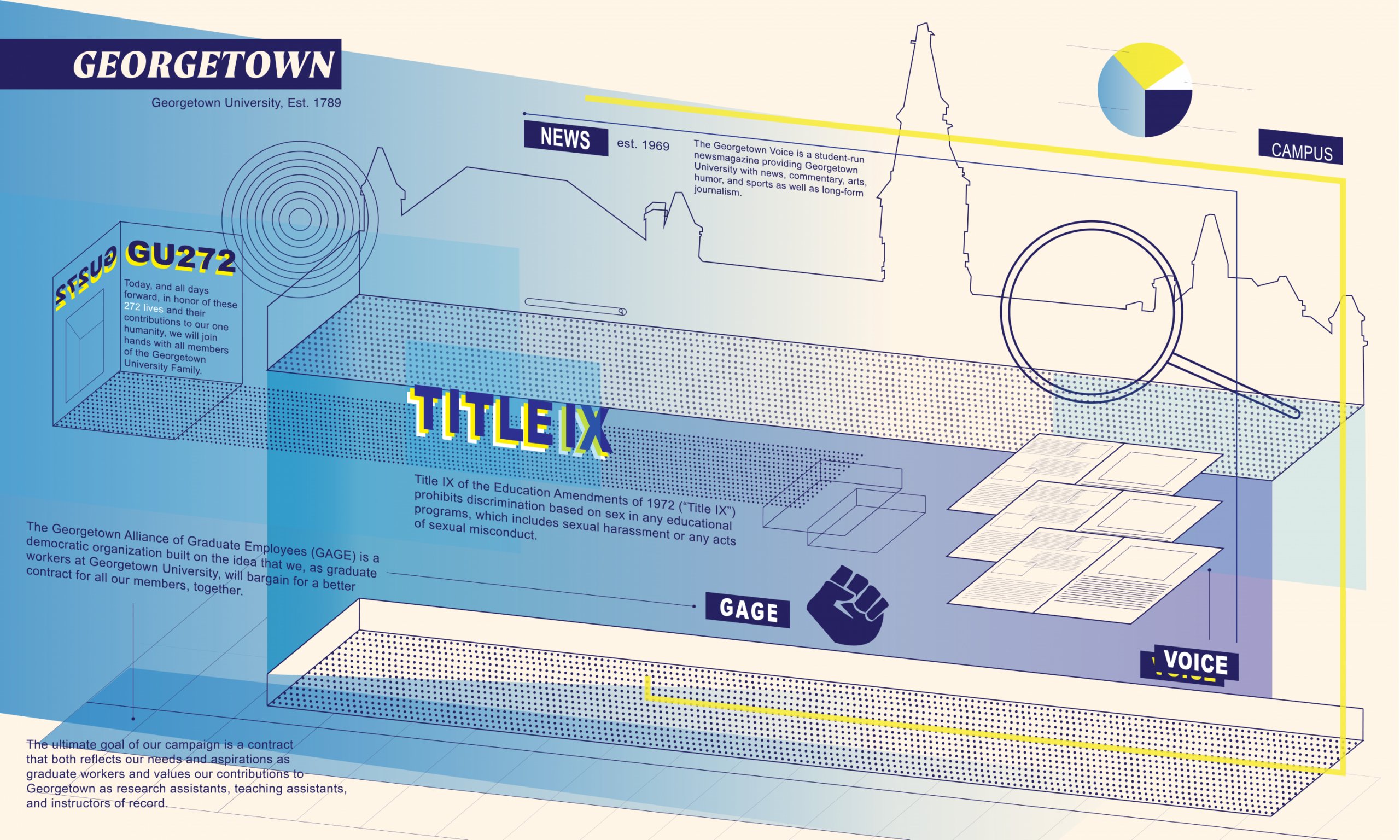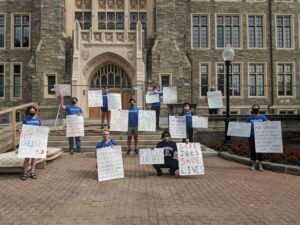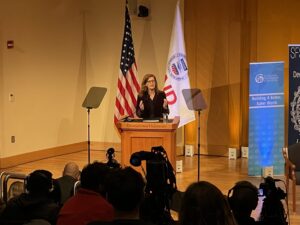When vaccines from Pfizer-BioTech and Moderna became available to the public and President John DeGioia announced that undergraduate students would return to campus in the spring, a COVID-19-free college experience seemed possible—even likely. Students expressed their excitement for the end to three semesters of so-called Zoom University in group chats, over social media, and in their limited in-person gatherings this summer. With variants spreading across the United States, however, the reality of vaccinated college life has not been what students envisioned.
While Washington, D.C. experiences its second wave of the coronavirus, the university has been struggling to communicate its safety protocols—even as testing numbers rise and an early flu season emerges. Georgetown’s commitment to a full return amid an ongoing pandemic has introduced new logistical difficulties: overcrowded dining halls, ad hoc hotel quarantining, and lacking enforcement mechanisms.
In preparing for a full return, Georgetown adopted a hardline stance on vaccinations in the hopes of mitigating the spread of COVID-19 on campus. This fall, Georgetown mandated that all students be vaccinated, although students are able to appeal on medical or religious grounds; they are granted in accordance with federal and local law, according to a university spokesperson.
Once the student body arrived in August, however, breakthrough cases quickly became evident. The university had 47 students test positive from Sept. 5 to 11, a 0.71 percent increase from the previous week. Comparatively, George Washington University tested 6,771 students in the same time frame and detected 71 total positives, an increase of 0.78 percent.
To further limit the spread, new policies on random asymptomatic testing and daily check-in surveys were announced in an email from Chief Public Health Officer Dr. Ranit Mishori on Aug. 27. It is unclear how random asymptomatic testing protocol will be enforced or if there will be consequences for students, staff, or faculty who fail to get tested when selected.
Another effort to keep track of cases and symptoms, the daily health attestation, also lacks an enforcement mechanism. Though the university described it as a mandatory step, students are able to access campus buildings without completing it.
The challenges around vaccination, testing, and contact tracing continue against a backdrop of an unseasonably early flu season, which has already made an impact on the campus population. Unprepared for the outbreak, the university recently announced two flu vaccination clinics this month, prior to the regular offerings come October. One of the two had already reached capacity less than 6 hours after the email was sent to the student body.
None of these issues are new to campus administration. During the Student Hilltop Immersion Program (SHIP) this summer, students were subject to regular testing, according to testing protocol. In addition, completion of the daily check-in survey was required to access academic buildings and the dining hall.
Some students, however, found their GOCards would remain green so long as they scheduled a COVID-19 test—regardless of whether or not they actually got tested. As Georgetown’s random asymptomatic testing and daily check-in requirements come into effect, questions of enforcement continue to plague protocol.
The uncertainty regarding Georgetown’s COVID-19 protocols has consequences for students’ mental wellbeing, in addition to their physical health. For Hoyas concerned about the virus, attending in-person classes can be a stressful experience. Many professors are not holding classes in a hybrid format or recording lectures, instead making courses available only in-person. Without the option to attend on Zoom, those who are uncomfortable with or unable to learn in the classroom environment are faced with a choice: drop the class, or attempt to learn in a space where they feel unsafe.
Isabel Janovsky (COL ’23) is one such student trying to walk the line between attending class and ensuring her safety. One of her professors, with a section of over 50 students, would not let students attend class virtually without an Academic Resource Center (ARC) accommodation or proof of a positive COVID-19 test. Until students began to test positive, the professor also was not recording lectures.
“It’s the school’s policy—not requiring [hybrid class] and not providing any incentive or reward for hybrid classes,” Janovsky said. The administration’s reactive approach to problems has made it difficult for students to safely navigate life on campus.
Janovsky has taken to purchasing rapid COVID-19 tests to store in her dorm for when Georgetown stops testing students on weekends or when an unforeseen exposure arises. “People are not behaving in ways that are safe,” Janovsky said. “People aren’t necessarily incentivized to get tested or to quarantine or to isolate because the university isn’t providing resources for that. I think it puts everyone in danger. The vaccines aren’t infallible.”
For Fr. Matthew Carnes, S.J.’s Comparative Political Systems class, for example, students must email multiple people to have a sick absence excused: the professor, the TA, and the advising dean. If that absence is due to COVID-19, the Covid Care Navigator must also be emailed, according to an email sent to one of Carnes’s discussion sections obtained by the Voice.
Details on who the Covid Care Navigators are and how to contact them, however, are sparse. While some professors have dispersed information on how to reach out to the team, not all professors have done so. Details of when and how to contact Navigators were sent out in an Aug. 20 email, but no correspondence regarding Covid Care Navigation has been communicated since.
At a high-stress academic institution like Georgetown, students may feel pressure to attend class regardless of their symptoms, putting other students at risk. With large classes of up to 250 students back in the classroom, symptomatic students attending classes make the dangers of breakthrough infections more pressing.
Professors are also required to create seating charts for their classes to make contact-tracing easier, but students have reported to the Voice that many have not done so. As a result, teachers frequently send emails to entire classes to notify the group of a positive COVID-19 test, regardless of close contact, making tracing significantly more difficult.
Students required to quarantine in the Georgetown University Hotel and Conference Center have additional challenges, such as mold on their food and limited hotel space. Non-infected students have taken to leaving food and other resources in front of hotel rooms for their friends.
For students living off-campus, instructions on when, where, and how to quarantine have been particularly vague. When Anna November (COL ’22) found out she and her five roommates had been exposed to COVID-19 and two had tested positive, it was unclear whether the latter two would be allowed to stay in the hotel like the COVID-positive students living on-campus.
“The coordinator who talked to my roommates directly said that we would have to quarantine at home, but the other coordinator, who talked to our friend who we were exposed to, got them into the hotel,” November said. “It was a lot of different pieces flying around all at once and luckily, for us, all the pieces landed where they needed to be.”
November and her roommates who had tested negative were also unsure how to quarantine. Although November says that she has felt supported emotionally by her COVID Care Navigator, she says that the support from the university and details on what actions to take after exposure have been more limited.
November and her three other COVID-negative roommates were given little instruction on quarantining protocols, she explained, and were told that they could resume normal activities after receiving their negative results the following day. They decided collectively, however, to get re-tested and avoid social gatherings for the following five days out of an abundance of caution.
When students like November are exposed to COVID-19, the difficulties of self-quarantining are compounded by a lack of university assistance. Currently, the university does not provide on-campus space, arrange food delivery, or provide other services to students living off-campus. On campus, university staff will deliver meals and other essentials to undergraduate students in self-quarantine.
While students struggle to understand university communications in regards to positive tests, almost every Hoya faces a thrice-daily struggle—Leo’s. The dining hall’s long lines at the start of the semester were the start of the overcrowded, unmasked groups eating inside the building several times a day. Under the university’s mandatory meal plan, all undergraduate students must purchase a meal plan, unless they receive an exemption.
Janovsky initially felt uncomfortable with the size of the crowds in the dining hall and eventually received a Kosher exemption from eating in the packed environment. “[The meal plan] causes way more financial hardship to people while also putting [students] in danger,” Janovsky said. She also emphasized how the requirement places dining staff in a similar unsafe predicament.
Georgetown’s COVID-19 policies are not unique in their approach. More than 680 public and private colleges required vaccine mandates for the fall semester, with varying approaches to religious, medical, or philosophic exemptions from their mandates. Of the 20 colleges in D.C., American University, Gallaudet University, George Washington University, Georgetown University, Howard University, Trinity Washington University, and University of the District of Columbia are all requiring vaccinations.
While Georgetown’s COVID-19 response plan included a combination of in-person, hybrid, and online classes, other colleges and universities, such as Cornell University, Spelman University, and New York University, announced they would return to nearly full in-person instruction.
At Spelman University, the lack of transparency on COVID-19 protection policies inspired a group of faculty members to compose an email announcing they would not be returning to in-person instruction.
This kind of disappointment and frustration is widespread among faculty members at universities across the country. Clemson University faculty members are planning a walkout to protest the administration’s decision to forgo a mask and vaccination mandate. Some tenured professors, like Jeremy Fischer at the University of Alabama in Huntsville, are leaving tenured positions as a result of insufficient COVID-19 policies.
Howard University has taken a very different approach to the pandemic. The university announced it would clear institutional debt for juniors and seniors facing financial hardships as a result of COVID-19. It joins a growing number of colleges, notably Historically Black Colleges and Universities (HBCUs), that are using funds from President Biden’s stimulus package to alleviate student debt.
In contrast, Georgetown’s financial aid packages significantly decreased throughout the pandemic, despite more than 1,000 students, alumni, and faculty signing a petition calling for the university to re-evaluate its decision. DeGioia responded by announcing that the university would review students’ requests for a new determination of their financial aid package.
Between financial aid difficulties and preoccupation with COVID-19 policies, many students are left confused or frustrated by Georgetown’s recent decisions and protocols. These sentiments have somewhat marred what should have been a joyful reunion on the Hilltop for some and the beginning of a college experience for others.
As students continue to test positive for COVID-19, keeping an eye out for further information and developments has grown ever-more important. With university policies left vague or unclear, students like November have felt left in the dark even as many try to remain COVID-vigilant. “It sort of feels like we’re all scrambling and listening to different sources of information on how to act when you’re in an uncertain situation,” she said.
If you are feeling unwell or suspect that you may have been exposed to COVID-19, limit your contact with others, schedule a COVID-19 test through OneMedical (or a third party provider), and email covidcarenavigator@georgetown.edu as soon as possible.






